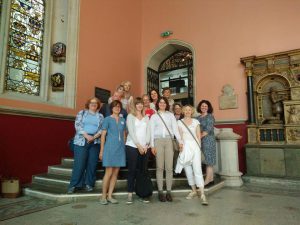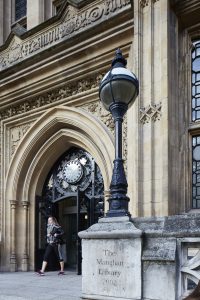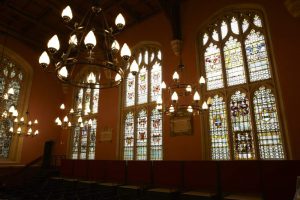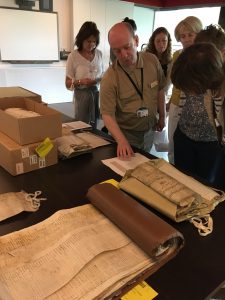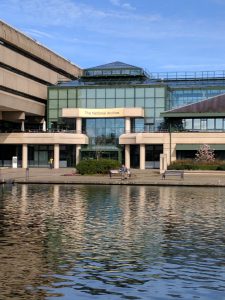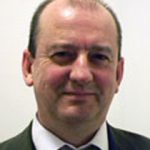 Mark Pearsall of The National Archives works in Collections, Expertise and Engagement. He worked previously in Birmingham Local Studies library and city archives. He has worked in several departments at The National Archives since then, mainly in reader services and records departments. During that time he has produced various guides and finding aids to the records and a number of publications including “Family History Companion”, and co-authored “Family History On The Move” and “Immigrants and Aliens”. His research interests include nationality and citizenship, parish history and administration and local government and county administration. As part of his job he give talks to family and local history groups, and other organisations and societies about the records in The National Archives and how to access them.
Mark Pearsall of The National Archives works in Collections, Expertise and Engagement. He worked previously in Birmingham Local Studies library and city archives. He has worked in several departments at The National Archives since then, mainly in reader services and records departments. During that time he has produced various guides and finding aids to the records and a number of publications including “Family History Companion”, and co-authored “Family History On The Move” and “Immigrants and Aliens”. His research interests include nationality and citizenship, parish history and administration and local government and county administration. As part of his job he give talks to family and local history groups, and other organisations and societies about the records in The National Archives and how to access them.
King’s College London and The National Archives came together last year to hold a family history summer weekend in August. The first day was held at The National Archives in Kew and the second day at King’s. Maughan Library in Chancery Lane is the building that housed the former Public Record Office (PRO), predecessor of The National Archives until 1996. Whilst collaborating on the King’s Summer Weekend with Dr Alana Harris from King’s History Department, we developed the idea for a podcast on our institutional history in the old places that King’s now occupies. The podcast will be available from autumn to all King’s students, used in history teaching, but also available as outreach material to anyone in the King’s community. Last summer, we went to look at the Weston Room, which used to house the PRO museum, but which was built on the site of the medieval Rolls Chapel.
King Henry III founded the house and church of the converts (Domus Conversorum) in 1232 in the street called ‘Neustrate’. Chancery Lane was originally called the ‘New Street’ and was made by the Knights Templar to run from their Old Temple in Holborn to the New Temple by the river Thames. The buildings were erected in 1232-33 and two chaplains appointed and the first Jewish converts admitted. In 1371 William Burstall was appointed keeper of the house of converts and he repaired the house, chapel and other buildings at his own expense. Burstall also became keeper of the rolls of Chancery, and in 1377 the house of converts was granted by Edward III and confirmed by Richard II to the keeper of the rolls of Chancery. From then on the keeper of the rolls was also the keeper of the house of converts. The house became the residence of the keepers or Masters of the Rolls until 1837.
The house of converts was pulled down and a new house for the use of the Master of the Rolls was built under the direction of architect John Campbell between 1717 and 1724. The Rolls Chapel was also repaired and improved at the same time. The Rolls House as the official residence of the Master of the Rolls became the main office of the new Public Record Office in 1838 and the Rolls Chapel had long been used for the storage of Chancery rolls. Most of the records were moved out on completion of the first block of the new record office in 1856. When the Public Record Office was extended in 1895 it was decided to demolish the Rolls Chapel. In its place a new museum was built of the same dimensions, and incorporating some of the monuments from the chapel. Three of the large monuments were re-erected, two of them in their former positions. Three memorial tablets were re-affixed to the walls and some of the old glass added to the windows on the south side. The burial vaults below the floor of the old chapel were enclosed in concrete. The new museum opened to be public in 1902 and is now the Weston Room of the Maughan Library.
King’s Summer Programmes and The National Archives will be holding their second family history summer weekend on Friday 3rd and Saturday 4th August 2018. The course as last year is designed to stimulate and challenge the participants and take them beyond the computer and the basic resources of birth, marriage and death certificates, census returns, and parish registers. Much can now be done online to build up a basic family tree of names and dates taking you back at least to the beginning of the nineteenth, or the late eighteenth century. Going further back can depend on the survival of original records and knowing what resources are available to the researcher to augment the basic names, relationships and dates. The summer weekend will provide research techniques and academic insight.
On day one at King’s, Audrey Collins of The National Archives and Dr Alana Harris of King’s Faculty of Arts and Humanities will cover the fascination of family research to find the stories behind the names and dates, exploring key themes such as class, professions and occupations, migration and place, putting the family in its social context. At lunchtime we will take participants on a visit to the Maughan Library. After lunch, Dr Denise Syndercombe-Court will discuss the value and the shortcomings of DNA analysis in what proved last year to be a very stimulating and thought provoking session and should be so again.
Day two will be held at The National Archives, Kew where I will talk about undertaking research in the archives and there will be a behind the scenes tour. Audrey and Alana will run a session on female ancestors and how to trace their lives and put them into a social context. The afternoon will be given over to research in the archives and surgeries to discuss specific topics and research methods. We aim to inspire people to undertake further and more fruitful research into their family histories.
The registration deadline is 20 July 2018. For further information please visit the webpage.

